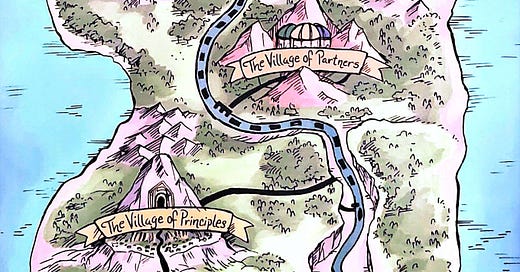When Ed Hajim was three, his father kidnapped him from his mother in St. Louis, took him to Los Angeles, and told him that his mother was dead. For two years, they moved in and out of cheap hotels, and when his father would take jobs on a merchant ship, he would leave Ed with neighbors for long periods of time. By the time he was 18, Ed had drifted between 20 different homes, left to care for himself “guided by a mixture of fear, common sense, and self-reliance,” he reflects. Oddly, finally being placed into an orphanage felt like a “lucky break” because he suddenly found “two things he’d never had: community and consistency.”
Ed delves into the details of his incredible childhood at the end of his book, The Island of The Four Ps: A Modern Fable about Preparing for Your Future. What he doesn’t really discuss is how he was ultimately able to make his way through higher education into a successful work life as the senior manager of many major investment firms and ultimately the CEO of Furman Selz—not to mention the chairman of various public boards. He also doesn’t write about how when he became the chairman of the board of trustees at his alma mater, the University of Rochester, he donated the largest single amount of $30 million ever given to the college.
It’s a stunning rags-to-riches story, and even more refreshing: Ed isn’t someone who believes he pulled himself up by his own bootstraps, even though what he survived required intense resilience, adaptability, and courage. Partners were key (one of the Four Ps), and partnership with friends, advisers, and collaborators is a core element of what he believes is necessary to achieve any goal.
While many authors have written about planning for the future, Ed does something quite different in The Island of The Four Ps. He shares his insights through a fable. Marketus, the main character, wends his way through four villages. He’s led by a guide, Archimedes, who provides him with a Tessamark, a small object that reminds him “to stop and think—to reflect on [his] experiences and the lessons they offer.” The purpose of this journey is ultimately for Marketus, and us as the readers, to find our inner voice.
Ed explains, “The only constant you have is your inner voice. And in order to make your conversation with your inner voice efficient, you have to have a vocabulary.” Ed proffers a simple vocabulary comprising eight words: The four Ps—Passions, Principles, Partners, and Plans— as well as the four dimensions of Self, Family, Work, and Community.
Even with a loaded word like “passions,” he breaks it down into “four simple questions: ‘First, what activities make time pass quickly? Second, what subjects do I hunger to learn about? Third, what tasks do I pursue with commitment and energy, without hesitation? And fourth, what do I daydream about?’”
Because you can easily read the book, I’m just going to highlight a few of my favorite parts of the book and our conversation. In the fable, Ed shares his own principles for life. Two of them resonated profoundly with me:
Seek freedom to make your own decisions.
Decide what’s enough—enough money, possessions, accomplishments, recognition, engagement, and love—and don’t pursue more than enough.
Ed urges young people to be deliberate about considering what is enough because, as he puts it, “I think balance is impossible unless you figure out what’s enough.”
Ed asks, “What rules are you going to follow? What lines do you not want to cross?” Each of us needs to determine the principles we want to live by and write them down. It’s as simple as grabbing a paper and pencil. The pencil part is important, as he explains here:
Although The Island of the Four Ps is geared toward young people earlier on in their life journeys, for many of us who find ourselves in the thick of it—maybe even having to pivot or reinvent ourselves for a longer, more uncertain world of work—this simple fable offers us an important moment to stop, reflect, and translate our experiences into insights about ourselves, our inner voice, and where it wants to lead us.
Dr. Michelle R. Weise is the author of Long Life Learning: Preparing for Jobs that Don’t Even Exist Yet and leads Rise and Design, which works with businesses and higher education institutions to turn research into action.





